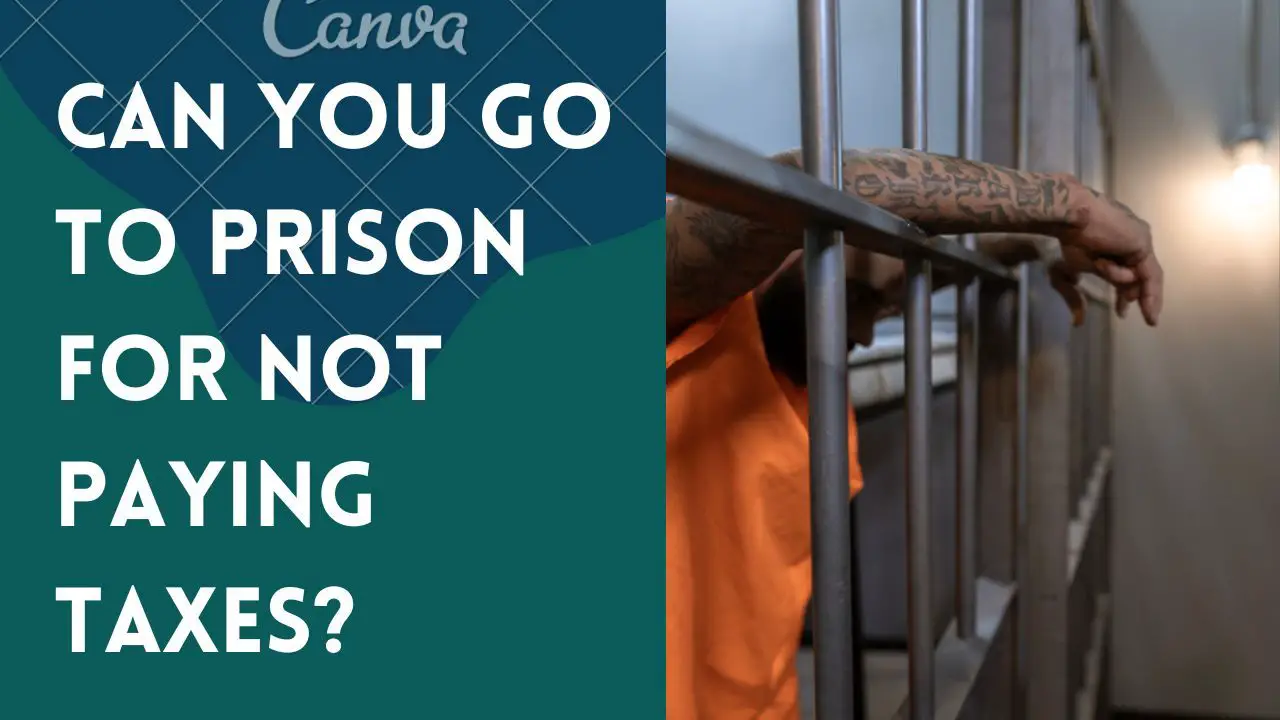Can You Go to Prison For Not Paying Taxes?
Can You Go to Prison For Not Paying Taxes? In this article, we have discussed tax which is a compulsory financial charge that is imposed on a taxpayer (an individual or company) by a governmental organization.

A tax is a compulsory financial charge (it may also be some other sort of levy) imposed on a taxpayer (an individual or company) by a governmental organization. Taxes are imposed to fund government spending and various public expenditures (regional, local, or national).
Tax compliance refers to policies and individual behavior aimed at ensuring that taxpayers are paying the right amount of tax according to their income and/or expenditure (in the case of companies or other legal entities) at the right time and securing the correct tax allowances and tax reliefs.
A failure to pay tax promptly (non-compliance) or evasion of or resistance to taxation is punishable by law. Taxes consist of direct or indirect taxes and may be paid in money or as labor equivalent if the taxpayer cannot pay.
Most countries have a tax system, enabling them to pay for public, common, or agreed-on national needs and some government functions. Some taxes are levied with a flat percentage rate on personal annual income. However, most scale taxes are progressive based on brackets of per annum income amounts. Most countries impose a tax on an individual's income as well as on their corporate income. Countries or subunits often impose wealth, inheritance, estate, gift, property, sales, use, payroll taxes, and duties and/or tariffs.
If you fall behind on your taxes and feel threatened every day by an impending notice from the IRS, you might wonder if not paying taxes can lead to a prison sentence. While it is possible in some cases, it may be that you have no reason to worry about it whatsoever. Below is a detailed explanation of non-compliance.
Criminal Vs. Civil Proceedings
Making an honest mistake on your tax return will not land you in prison. Very few tax evaders end up being prosecuted. Most tax law violations are civil offenses, not considered criminal by the IRS. If you're audited and haven’t paid full taxes, a civil judgment is placed against you to collect the remaining tax money.
You can only end up in jail for tax law violations if criminal charges are filed against you and you are prosecuted and sentenced in a criminal trial before the court. The most common tax crimes listed by the IRS are tax fraud and tax evasion. Tax evasion is when you willfully attempt to evade taxes even when you are financially able to pay them. Tax fraud involves intentionally trying to deceive the IRS by understating your assets.
Tax fraud differs from a taxpayer being confused by the tax form or placing numbers in the wrong line, which are merely honest mistakes.
Who does the IRS target?
The IRS mainly targets people who understate their assets and what they owe. Tax evasion cases mostly begin with taxpayers who:
- Misreport income, assets, credits, and/or deductions on tax returns
- Do not file a required tax return
The IRS doesn’t pursue many tax evasion cases for people who cannot pay taxes. However, in the case of the concealment of assets and income that you could use to pay your back taxes, there’s a different story.
The truth is very few taxpayers go to jail for tax evasion. In 2015, the IRS charged only 1,330 taxpayers out of 150 million for legal-source tax evasion compared to illegal activity or narcotics.
Criminal Prosecution of Taxpayers
Usually, tax evasion cases on legal-source income begin with an audit of the filed tax return. In the audit, the IRS finds errors that the taxpayer knowingly and willingly committed, trying to falsify records. The error amounts are usually quite large and occur over a wide span of years, showing a pattern of willful evasion.
Other things that the IRS looks for are as follows:
- Unreported income: This is the biggest issue that brings taxpayers under criminal investigation, and it includes leaving out specific transactions, like the sale of a business, or sometimes even entire sources of income, such as income from a side job or business. This issue has gotten many big economy workers in trouble with the IRS, as they leave out income from their side hustle.
- Dodgy behavior during an audit: People who make false statements or purposely hide records (such as bank accounts) from an IRS auditor receive criminal prosecution. The IRS calls such evading behaviors “badges of fraud.” Such behaviors are strong indicators of tax evasion.
How To Land In Prison With Tax Evasion?
The IRS is more lenient with people who file their taxes but are unable to pay as opposed to non-filers who don't pay their taxes. Penalties for Failure to file are much higher than late payment penalties. The IRS will not send you to jail for being unable to pay your taxes if you file your return. The following actions can lead to jail time for one to five years:
- Tax Evasion: Any action taken to evade a tax assessment, such as filing a fraudulent or falsified return, can land you in prison for five years.
- Failure to File a Return: Failing to file a return can get you jail time of one year for every year you failed to file it.
- Helping Someone Evade Taxes: Helping someone else evade paying their taxes can result in imprisonment for up to 5 years, depending on the severity of the situation.
Degree of Limitations for Criminal Charges
If the government finds you guilty and intends to file criminal charges against you for non-compliance regarding your tax payment, there is a limited time to file charges. Depending on the nature of the alleged wrongdoing, criminal charges are generally filed within 6 years of the violation.
The IRS also has a set time limit on collections. The IRS generally does not take collection action after 10 years from the assessment date. If a return was filed 10 years ago, but the associated taxes were never paid, the filer will not be criminally charged, and the IRS will not try and collect the unpaid taxes.
Payment Plan To Pay Taxes
If your taxes are mounting up and you find that they are more than you can afford, you have better options than simply not paying and awaiting a sentence.
- Individual Installment Agreement: You can set up a plan that lets you pay down your back taxes over time with regular monthly installments. You will need to provide the IRS with detailed information on your assets, such as real estate and investment accounts, household expenses, or any other business.
- Offer In Compromise: This is an agreement between you and the IRS to settle your tax liability for less than the full amount of taxes you owe. It's generally not an option when the IRS thinks you can pay down your debt through a payment plan. This determination is decided based on your “reasonable collection potential."
Legal Help for Taxpayers
Failing to comply with the IRS or state taxation rules and regulations can result in serious civil and criminal penalties. And the longer you cannot pay your taxes, the more serious the situation becomes. It's a good idea to contact an experienced tax lawyer who can advise you on how best to proceed in resolving your situation and which payment plan to opt for.
You can also read articles related to this topic;
- What to Wear to Visit Someone in Jail: What Can I Wear to Go to a Maximum Security Prison?
- Phillips State Prison: Visiting Information, History of This Facility, Inmates Phone, Mail, And FAQ About This Prison
- Pickaway County Active Inmates: How to search for Active Inmates of Pickaway County Prison
- Trumbull County Jail: Brief Overview Visiting Hours, Inmate Phones, And Sherif's Location
- Worst Prisons In The State Of West Virginia
- Marion County Inmate Roster: Complete Information, Sheriff's Office, Visiting Hours
- Pickaway County Active Inmates: How to search for Active Inmates of Pickaway County Prison
- Trumbull County Jail: Brief Overview Visiting Hours, Inmate Phones, And Sherif's Location
